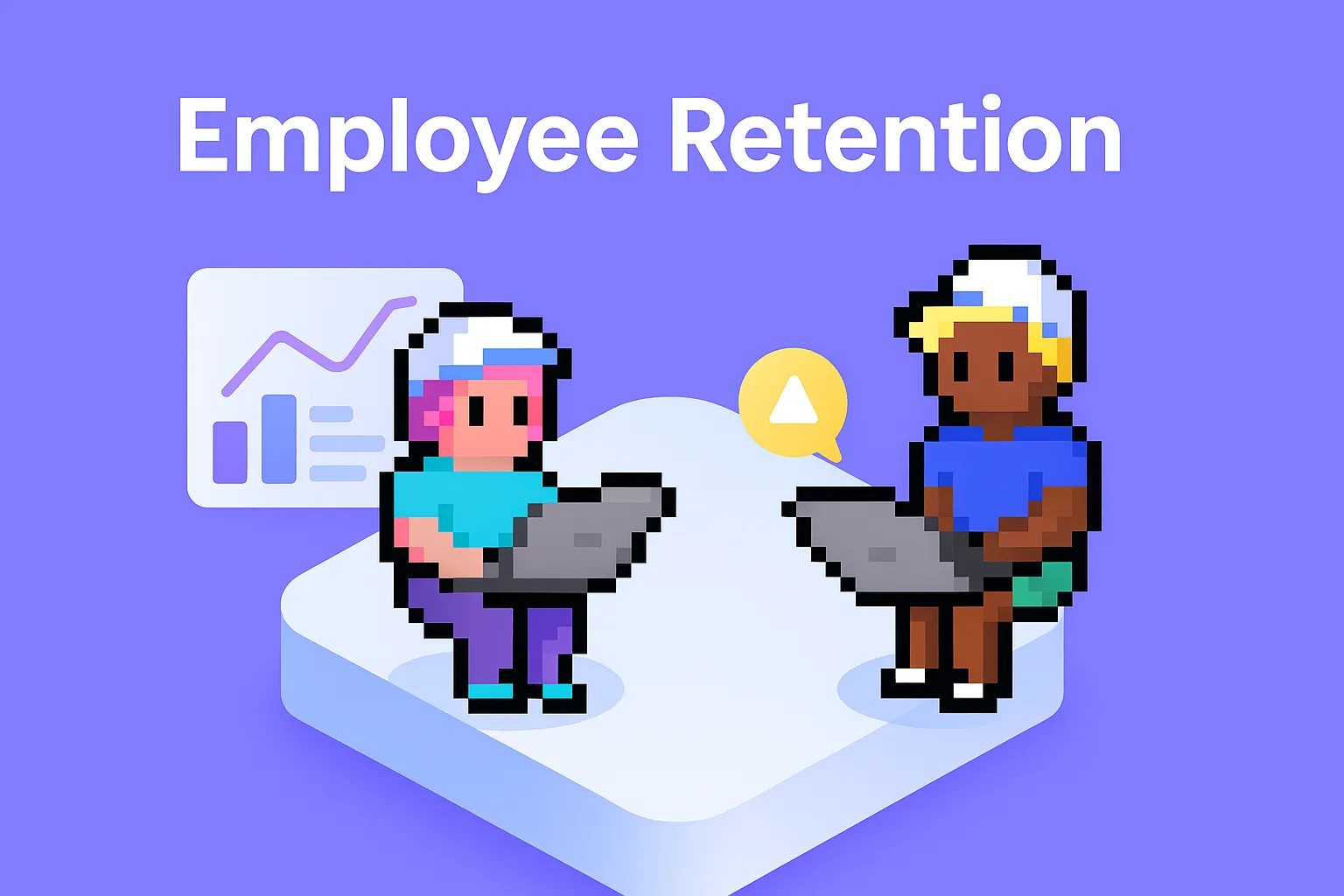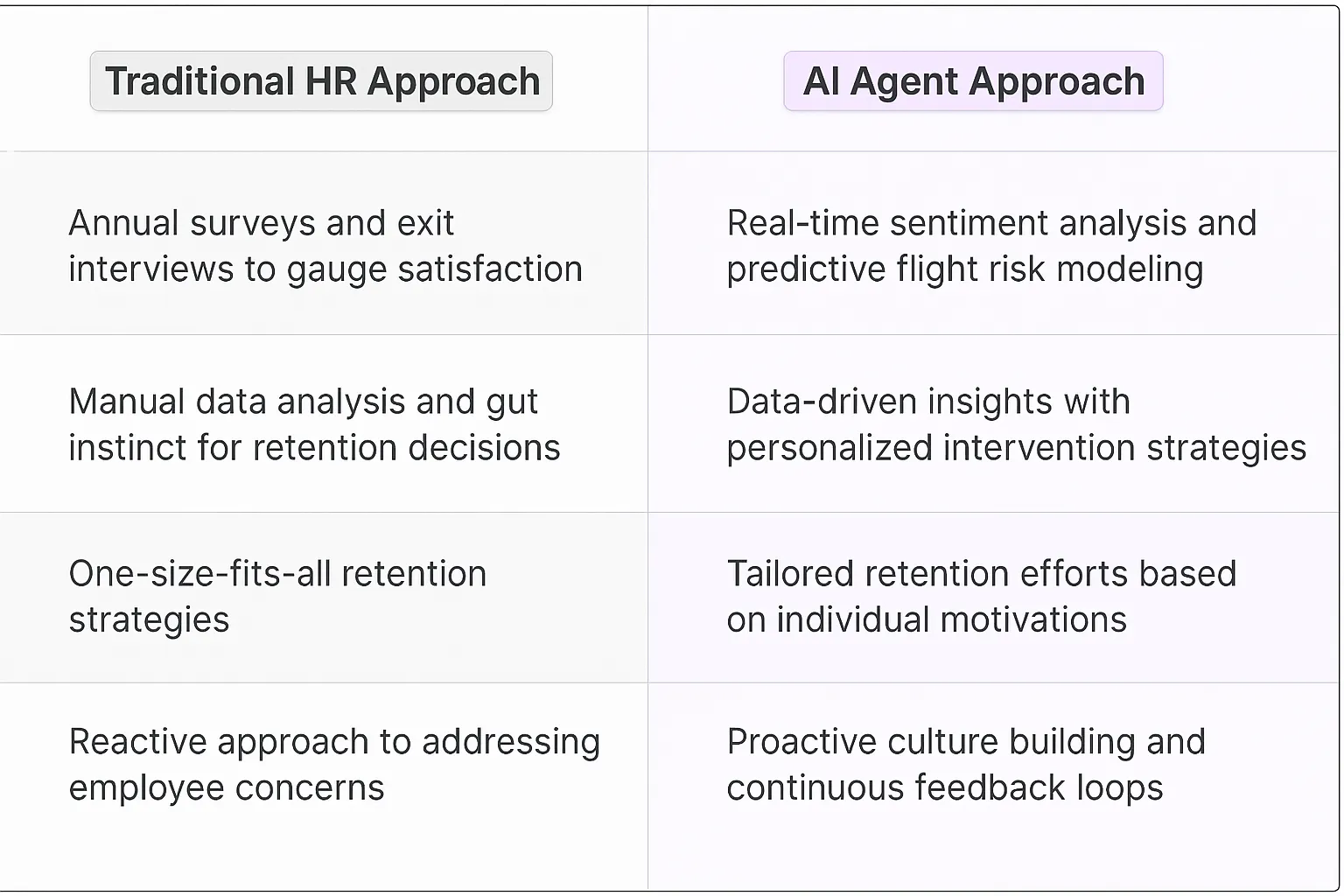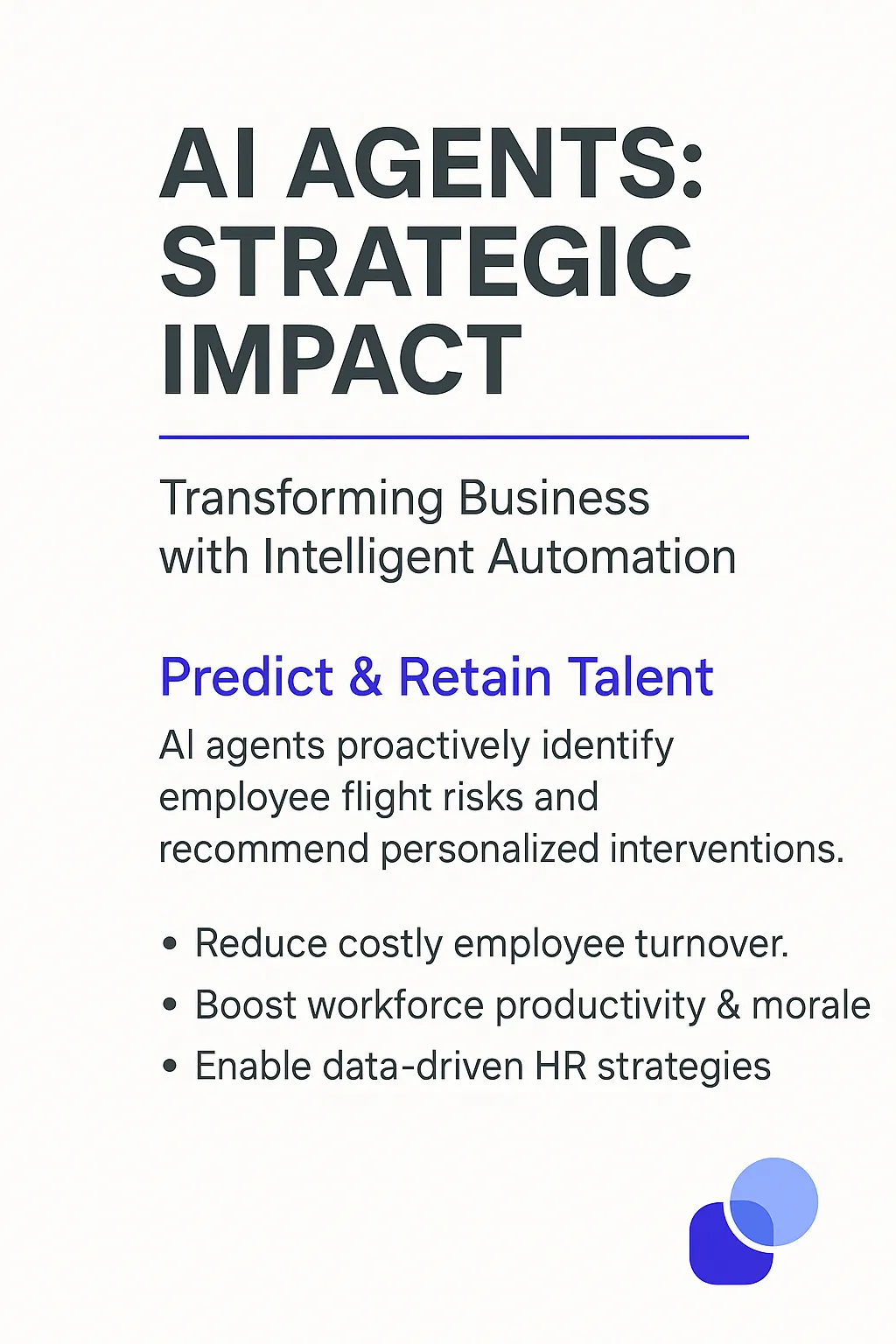Talent Retention AI Agents
The Rise of AI in Talent Retention Strategies
Talent retention is the art and science of keeping your best people around. It's not just about preventing turnover; it's about creating an environment where top performers want to stay, grow, and contribute their best work. In the past, this was a high-stakes guessing game. Now, with AI agents, it's becoming a data-driven, personalized strategy that can give companies a serious edge.
These digital teammates are game-changers in the HR world. They offer predictive power, spotting flight risks before humans even sense a problem. They provide personalized interventions, tailoring retention efforts to each individual's motivations and career aspirations. AI agents create a real-time feedback loop, allowing companies to address issues as they arise. They reduce bias, offering a more objective view of employee satisfaction and potential. Perhaps most importantly, they're scalable, able to handle thousands of employees without breaking a sweat.

Benefits of AI Agents for Talent Retention
What would have been used before AI Agents?
Before AI agents entered the talent retention scene, companies relied on a mix of traditional HR practices and gut instinct. They'd use annual surveys, exit interviews, and the occasional team-building exercise to gauge employee satisfaction. It was like trying to understand the entire ocean by dipping your toe in once a year.
HR teams would spend countless hours manually sifting through data, trying to spot patterns and predict who might be eyeing the exit. Managers would rely on their "spidey sense" to detect when a top performer was getting restless. It was a high-stakes guessing game with real business consequences.
What are the benefits of AI Agents?
Enter AI agents for talent retention. These digital teammates are like having a team of world-class psychologists, data scientists, and HR experts working 24/7 to keep your talent happy and engaged. Here's the real deal:
1. Predictive Power: AI agents can spot flight risks before humans even sense a problem. They're constantly analyzing patterns in employee behavior, communication, and performance. It's like having a crystal ball that actually works.
2. Personalized Interventions: Gone are the days of one-size-fits-all retention strategies. AI agents can tailor retention efforts to each individual's motivations and career aspirations. It's like having a personal career coach for every employee.
3. Real-time Feedback Loop: These agents don't wait for annual reviews. They provide continuous insights, allowing companies to address issues as they arise. It's like having a finger on the pulse of your organization at all times.
4. Bias Reduction: Unlike humans, AI agents don't play favorites or make decisions based on office politics. They offer a more objective view of employee satisfaction and potential, helping to create a fairer workplace.
5. Scalability: As your company grows, these AI agents can easily scale to handle thousands of employees without breaking a sweat. Try doing that with a traditional HR team.
6. Proactive Culture Building: By identifying trends and commonalities among satisfied employees, AI agents can help shape company culture proactively. It's like having a master gardener constantly tending to your company's ecosystem.
The bottom line? AI agents for talent retention are not just a nice-to-have. They're becoming as essential to modern business as email or cloud storage. Companies that embrace this tech will have a serious edge in the war for talent. Those that don't? Well, they might find themselves constantly refilling seats instead of growing their business.

Potential Use Cases of AI Agents for Talent Retention
Let's dive into how AI agents can transform talent retention strategies. These digital teammates aren't just fancy chatbots - they're powerful tools that can reshape how companies keep their best people around.
Processes
- Personalized employee engagement: AI agents can analyze individual employee data to tailor engagement strategies, making each team member feel uniquely valued.
- Predictive attrition modeling: By crunching vast amounts of data, AI can flag potential flight risks before they even start looking elsewhere.
- Continuous feedback loops: AI-driven systems can facilitate ongoing, real-time feedback between employees and managers, replacing outdated annual reviews.
- Career path optimization: AI can map out potential career trajectories within the company, showing employees clear growth opportunities.
Tasks
- Sentiment analysis of internal communications: AI can gauge employee morale and satisfaction by analyzing company-wide emails, Slack messages, and other internal comms.
- Automated exit interview analysis: When people do leave, AI can dissect exit interviews to uncover patterns and actionable insights.
- Personalized learning and development recommendations: Based on an employee's skills, goals, and company needs, AI can suggest tailored training programs.
- Real-time compensation benchmarking: AI can continuously monitor market rates for various roles, ensuring your compensation packages stay competitive.
The game-changer here is how these AI agents can operate at scale, handling thousands of employees simultaneously with a level of personalization that would be impossible for human HR teams alone. It's not about replacing HR - it's about giving them superpowers.
But here's the kicker: the real magic happens when you combine these AI capabilities. Imagine an AI that can predict when an employee might be thinking of leaving, immediately trigger a series of personalized interventions (like a chat with their manager, a tailored learning opportunity, or a compensation review), and then track the effectiveness of these interventions in real-time.
That's the kind of retention strategy that can give companies a serious edge in the talent wars. It's not just about keeping people around - it's about creating an environment where top talent thrives and wants to stay. And in today's competitive landscape, that's worth its weight in gold.

Industry Use Cases for Talent Retention AI Agents
AI agents are reshaping talent retention strategies across sectors, offering tailored solutions to age-old HR challenges. These digital teammates aren't just fancy chatbots; they're sophisticated tools that can analyze patterns, predict employee behavior, and proactively address retention issues before they escalate. Let's dive into some industry-specific scenarios where AI agents are making a tangible difference in keeping top talent on board.
From tech startups to Fortune 500 companies, organizations are leveraging these AI-powered allies to create more engaging work environments, personalize career development paths, and even predict which high-performers might be eyeing the exit. The result? A more satisfied workforce, reduced turnover costs, and a competitive edge in the talent market.
But it's not just about keeping butts in seats. These AI agents are helping companies build cultures where employees genuinely want to stay and grow. They're uncovering insights that human HR teams might miss, leading to more informed decisions and strategies that resonate with the modern workforce.
So, let's explore how different industries are putting these digital retention specialists to work, shall we?
Tech Startups: Scaling Culture with Talent Retention AI
In the high-octane world of tech startups, talent is the lifeblood that fuels innovation and growth. But as these companies scale at breakneck speeds, maintaining the cultural magic that attracted top performers in the first place becomes a Herculean task. Enter Talent Retention AI agents – the secret weapon for startups looking to keep their edge as they expand.
These digital teammates act as cultural custodians, tapping into the pulse of the organization through a variety of data sources. They analyze everything from Slack conversations and project management tools to peer feedback and performance metrics. But here's where it gets interesting: instead of just spitting out generic engagement scores, these AI agents craft personalized retention strategies for each employee.
For the product designer who's been putting in long hours but feels her ideas aren't being heard, the AI might suggest a one-on-one with the CTO. For the backend engineer who's been crushing it but hasn't had a salary review in 18 months, it could flag the discrepancy to HR before the developer starts browsing LinkedIn.
The real power lies in the AI's ability to spot patterns and intervene before issues snowball. It might notice that teams who have regular virtual coffee chats have 30% lower turnover, prompting leadership to bake these informal connections into the company's remote work policy.
By continuously learning and adapting, these AI agents help startups maintain their cultural DNA even as they scale from scrappy teams of 20 to multinational organizations of 2000+. It's like having a chief culture officer for every employee, ensuring that the passion and purpose that drove early success doesn't get lost in the chaos of hypergrowth.
Hospitality: AI-Driven Talent Retention in the Ever-Changing World of Hotels
The hospitality industry is notorious for its high turnover rates and the constant challenge of keeping top talent engaged. But what if we could flip the script? Enter Talent Retention AI agents for hotels – the game-changer that's about to transform how we think about employee satisfaction in an industry where the guest experience is everything.
These AI agents are like having a hyper-intelligent HR director for every single employee, from the front desk to the kitchen. They're constantly analyzing a treasure trove of data: shift preferences, guest feedback, peer reviews, and even the subtle indicators of job satisfaction that humans might miss.
Here's where it gets interesting: these AI agents don't just crunch numbers – they create personalized career paths. For the concierge who's been killing it with guest recommendations, the AI might suggest a fast-track program to management. For the sous chef who's been experimenting with local ingredients, it could propose a collaboration with the marketing team to showcase their innovations.
But the real magic happens when these AI agents start predicting potential departures before they happen. They might notice that housekeeping staff who work more than three consecutive weekends are 40% more likely to quit within the next month. Armed with this insight, managers can proactively adjust schedules and prevent burnout.
These digital teammates also become cultural translators in international hotel chains. They can identify when a European management style is causing friction with a US-based team, suggesting tailored training programs to bridge the gap.
The result? Hotels that feel less like revolving doors and more like launchpads for fulfilling careers. It's not just about keeping people – it's about nurturing talent in an industry where every interaction counts. And in the process, these AI agents are helping hotels build the kind of loyal, passionate workforce that turns first-time guests into lifelong customers.
As we look to the future, the hotels that embrace these AI-driven retention strategies won't just be saving on hiring costs – they'll be creating the kind of workplace culture that becomes a competitive advantage in itself. It's a shift that could redefine what it means to work in hospitality, turning a traditionally transient industry into a beacon for long-term career growth.
Considerations
Technical Challenges
Building a Talent Retention AI Agent isn't just about slapping some machine learning models together and calling it a day. It's a complex beast that requires serious technical chops and a deep understanding of both human behavior and organizational dynamics.
First off, you're dealing with massive amounts of unstructured data. Employee feedback, performance reviews, communication patterns – it's a messy soup of information that needs to be cleaned, structured, and made sense of. Your AI needs to be a data wrangler extraordinaire, capable of extracting meaningful insights from this chaos.
Then there's the challenge of building predictive models that actually work. We're not talking about simple linear regressions here. You need sophisticated algorithms that can identify subtle patterns and correlations in employee behavior that signal flight risk. And these models need to adapt and improve over time as they ingest more data and learn from their successes and failures.
Privacy and security are another major hurdle. You're dealing with sensitive employee data, so your AI needs to be Fort Knox-level secure. Encryption, access controls, and compliance with data protection regulations like GDPR are non-negotiable. One data breach and you can kiss your talent retention efforts goodbye.
Operational Challenges
On the operational side, implementing a Talent Retention AI Agent is like trying to perform heart surgery while the patient is running a marathon. You're dealing with a living, breathing organization, and you can't just hit pause while you figure things out.
Integration with existing HR systems is a major pain point. Your AI needs to play nice with your HRIS, performance management tools, and communication platforms. It's like trying to get a bunch of toddlers to cooperate – each system speaks its own language and has its own quirks.
Then there's the human factor. Employees might view the AI as Big Brother watching their every move. You need a solid change management strategy to overcome this resistance and build trust. It's not enough to just roll out the technology; you need to create a culture that embraces data-driven talent management.
Training is another big challenge. Your HR team needs to become part data scientist, part AI whisperer. They need to understand how to interpret the AI's insights and translate them into actionable retention strategies. It's a whole new skill set that most HR professionals don't have.
Finally, there's the ROI question. Talent retention is notoriously hard to measure, and it's even harder to attribute improvements directly to your AI. You need to develop sophisticated metrics and measurement frameworks to prove that your digital teammate is actually moving the needle on retention.
Implementing a Talent Retention AI Agent is not for the faint of heart. It's a complex, multifaceted challenge that requires a perfect storm of technical expertise, operational finesse, and cultural transformation. But for those who can pull it off, the potential rewards in terms of reduced turnover and improved employee satisfaction are enormous.
AI Agents: The Future of Talent Retention and Workplace Culture
AI agents for talent retention are not just another HR tool; they're a fundamental shift in how companies approach their most valuable asset: their people. By leveraging the power of AI, organizations can create a virtuous cycle of engagement, growth, and retention that drives business success. The companies that embrace this technology won't just be saving on hiring costs; they'll be building the kind of workplace cultures that become a competitive advantage in themselves. As we look to the future, the question isn't whether you can afford to implement AI-driven retention strategies, but whether you can afford not to. The war for talent is only getting fiercer, and AI agents might just be the secret weapon that separates the winners from the also-rans.













